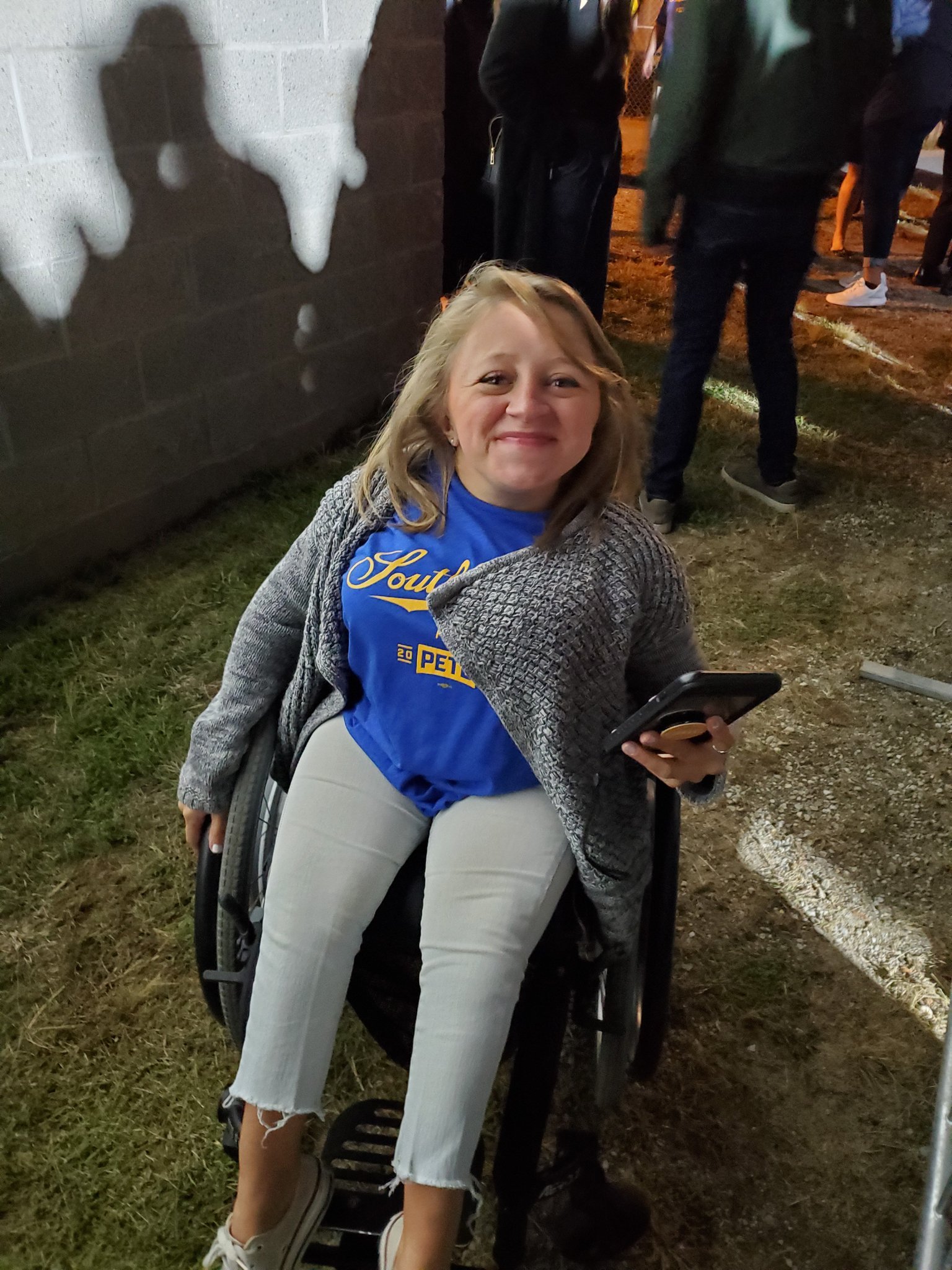Self-Care on the Campaign Trail: Disabled Leaders Share Their Wisdom
Political campaigns are intense environments. A political campaign is always working on a deadline, whether that’s meeting fundraising goals or conducting GOTV before a primary or election. There’s pressure to put aside everything else in your life and push towards the finish line. It’s no wonder that staff and candidates in campaigns across the political spectrum have been plagued by burnout. In response to this challenging environment, more progressive campaign staff and political parties have begun to unionize to fight for better working conditions.
Intense campaign environments are particularly taxing for many disabled people due to systemic inaccessibility. It’s much more challenging to reach canvassing goals when the neighborhood you’re canvassing is inaccessible, or you have a disability that causes fatigue or chronic pain. Disabled people often have to work even harder than their nondisabled counterparts when we deal with systemic inaccessibility or ableist judgments. The pressure to postpone doctors’ appointments, cut back on rest, or otherwise ignore our self-care can lead to faster burnout and negative impacts on our health.
To build sustainable political power, we must prioritize caring for ourselves, our staff, and our volunteers. Taking care of ourselves, and ensuring that our campaign staff and volunteers have time to take care of themselves, is not a distraction from the campaign. It’s an investment in our wellbeing and the wellbeing of our community.
So how do candidates and campaign staff prioritize taking care of themselves on the campaign trail? We reached out to disabled elected officials and campaign staffers for their experience and advice.
For our first question, we asked: How did you balance campaigning and self-care on the campaign trail?
Councilwoman Jenn Wolff
Jenn Wolff is the City Councilwoman representing Ward 2 in Waverly, Iowa, and a former candidate for Iowa State Senate.
“I balanced campaigning and self-care by making sure I was surrounded with positive, supportive people and by trying to spread things out so there were 1-2 events a day rather than 3-4. I tried really hard during the first race (which I knew I would probably lose) to keep in mind that I was bringing critical issues to more constituents’ attention as well as showing folks that disabled people CAN run for office.”
Ashley Everett
Ashley Everett is an experienced organizer, strategist, and campaign manager.
“All of the normal advice applies here: sleep, eating well, and exercise. However, campaigns, especially field operations, are hard on the body and mind. Balance is often hard to find on a campaign and is something you must instead demand, whether that is taking a lunch break away from your computer or asking for remote accommodations for a role, you must carve out that space for yourself.
I know we do important work but, you as a person are far more important to your family and friends than you could ever be to a campaign. As a disabled staffer, my "spoons" are limited and these two concepts are my guiding stars as to whether or not to extend myself past what I know I can give, whether that be time, effort, attention, physical labor--you name it.
Additionally, because you can not fill from an empty cup and because the balance creates space for it, self-care is one of the best things we can do for ourselves. Sure, candles and yoga are wonderful forms of self-care but so is therapy, and so is finding communities where you can find support and love.”
Councilwoman Mary Zendejas
Councilwoman Mary Zendejas has represented District One in Long Beach, California since 2019.
“Running for elected office as a candidate with a disability brings many challenges, including how to balance self-care while on the campaign trail. Campaigning requires long hours of hard work every single day, for months at a time. Balancing self-care initially for me was low on my priority list. It wasn’t until I felt my body shutting down on me that I realized that if I wanted to win the election, I truly needed to take care of myself and make self-care a priority.
I was successful in balancing self-care and win my elections by being intentional. First, I had to make sure that I had a good plan. I evaluated all the invitations and opportunities that came into the campaign office and prioritized the ones that were essential and worked around the ones that weren’t. Second, I made sure that my campaign team knew what my needs were every single day, including making accommodations in our office so that I could feel comfortable being there long hours at the time. Lastly, whenever I was getting to the point where I felt drained, I made sure to communicate to my campaign team so that they knew that I would need time to recover.
Though I pride myself on being independent despite a disability, it was hard for me to ask for help. I soon realized that if I did not ask for help, I would not get the help that I needed. I was successful in winning my first election and my reelection because I had a great campaign team that believed in me and was ready and willing to take on whatever was needed. I was able to communicate my personal care needs, my mental health needs, and my physical needs to them with ease.”
Emily Voorde
Emily Voorde is the Founder & CEO of INTO Strategies, an access and inclusion consultancy; a former White House liaison to disabled Americans, Presidential campaign staffer, and classroom teacher.
“I set myself up for success by finding rest and respite for my body when and where I could. On days off of the campaign trail, I focused on resting, eating well, recharging my social battery, and addressing aches and pains. I’m the kind of person that is easily distracted from physical pain when my schedule is busy. This might seem like a good thing, except that it means that the pain often compounds and forces me to pay attention sooner or later.
On the campaign trail, I was intentional about packing items that would help me take care of my body and mind during down time and in the evenings. I always packed tea, my heating pad, lidocaine patches, OTC pain medication, anti-inflammatories, BioFreeze, and my TENS unit - all small enough to fit in a carry-on suitcase. I didn’t need them every day, but they were welcomed tools after a particularly tough day.”
For our second question, we asked: what advice do you have for a candidate or campaign staffer who is being pressured to put aside their wellbeing for the campaign?
Councilwoman Jenn Wolff:
“Make sure to stand up for yourself. If you don’t take care of yourself first and foremost, it’s difficult to do a good job throughout the campaign.”
Ashley Everett:
“Don't. It's not worth it. In politics, we tend to run at an abnormally fast-paced speed that doesn't always matter [to] the truth of what we are hoping to accomplish. Working in progressive spaces especially, we can't say we stand taking care of mental health, but then create these systems with toxic bosses, micromanaging supervisors, and a culture of burnout. There is no reward for stressing yourself out and putting aside your well-being for a campaign/job/ manager who would fire you tomorrow if it was financially expedient.”
Councilwoman Mary Zendejas:
“I would advise candidates to not put aside their well-being while running for elected office and to really take the time to evaluate their needs and make a commitment to themselves and their boundaries. Talk to your campaign team openly about your needs. It is important to have a great communication system in place with everyone involved in the campaign. Don’t be shy or shameful about what you need. At the same time, remember that you will need to work hard every single day to win the election. To be successful in winning the election, there must be a balance between hard rigorous work and self-care, and the best way to accomplish that is by having a plan, prioritizing activities, and communicating needs clearly. I also advise candidates of the importance of fundraising to be able to run a successful campaign and win their election. Votes from constituents are just as important as money raised, especially if they have a disability that prevents them from going door-to-door to talk to voters.”
Emily Voorde:
“Contrary to outside perceptions, we know that it’s impossible to turn our disability ‘on’ and ‘off’. It’s not something that we can set aside, nor is it something we “overcome”. Therefore it’s critical to know yourself, know your body, and know your personal limits. If it’s implied that you’re setting aside or “overcoming” your disability; don’t be afraid to tactfully push back.
Set realistic expectations with yourself and others about your output. When appropriate, explain that productivity might sometimes look different than normative, non-Disabled productivity. For example, working from home or from an infusion appointment might be necessary - but the work will still get done! Normalize mobility devices and mobility aids. Bring your heating pad to the office, wear loop headphones while working, or hook up your TENS unit pads during lunch.”




